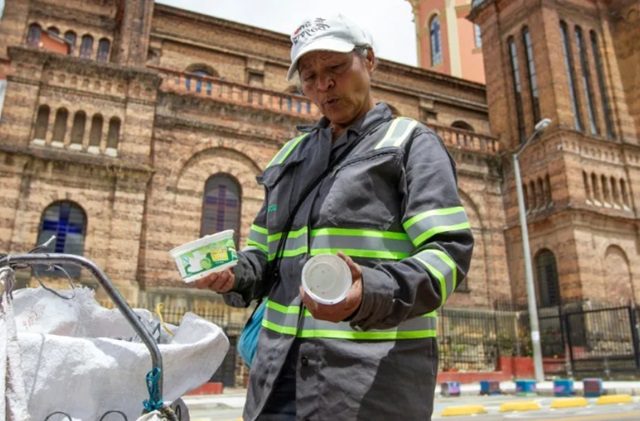BTN News: As a child, Miriam Calderón tended cattle. Later, she cleaned houses. Now at 68, she scrapes together a living as an informal recycler. But a new pension reform in Colombia offers hope to people like her who missed out on retirement benefits.
Miriam, a sturdy woman with gray hair, hauls bags of garbage through the streets of Bogotá to support her household. She shares her home with her ailing 85-year-old husband, Francisco de Paula López. Despite her fatigue and a voice strained by hardship, she recalls a recent dilemma: “I didn’t know whether to pay rent or eat,” she tells AFP.
She secures her collection to a rickety metal cart and navigates the steep streets of Las Cruces, one of Bogotá’s oldest and most dangerous neighborhoods. Her earnings? A mere three or four dollars a day.
Struggling in a Country with High Informality Rates
Colombia has one of the highest rates of informal employment in Latin America, with 56% of the workforce lacking formal job benefits. This leaves about 2.6 million elderly people without pensions, living in poverty, according to the Ministry of Labor.
To address this issue, President Gustavo Petro has introduced a pension reform that increases monthly subsidies for the poorest elderly citizens from $30 to $55. While this amount is still far from the minimum wage of $250, it lifts these vulnerable individuals above the extreme poverty line.
A Blessing for the Needy
Francisco, who ran his own home repair business until a stroke left him disabled, was among the first to receive this new assistance. “When I went to collect it, I almost cried from joy… That increase in the benefit… Bless the Lord!” says Miriam, who finds strength even to confront the homeless who try to steal her materials.
Next year, the reform will extend benefits to women over 57 and men over 62, unless right-wing opposition succeeds in overturning the law in the Constitutional Court. “Why deny us what we’ve worked for? … I shouldn’t have to pick up trash,” Miriam says, voicing her frustration with the law’s detractors.
A Lifeline for Elderly Workers
Miriam and her husband, under the scorching Andean sun, walked to Bolívar Square to attend the public event where President Petro signed his first social reform into law. Nearby was Deyanira Cruz, a 65-year-old woman with a short haircut and a warm smile. Like Miriam, Deyanira has rarely had a day off.
“I started working when I was a child… I was 10 years old, but I had to look after two little kids,” Deyanira recalls in the living room of her apartment in Soacha, a suburb of Bogotá, which she shares with her daughter and teenage granddaughter.
Deyanira’s home, small, bright, and tidy, mirrors the “rich houses” she worked in most of her life. Without a labor contract, she often earned less than the minimum wage. “Many women weren’t paid, just given food and shelter. I was lucky to find good families,” she says, explaining that some of her employers even gave her the furniture that now decorates her living room.
Diverse Employment Experiences
In addition to her domestic work, Deyanira also sold street food and worked as a messenger for a construction materials store, all while raising two children alone. “If there were 24 hours in a day, I worked practically 19 or 18 hours to get ahead,” she recounts.
Upon reaching retirement age (57 years), Deyanira found that the pension system only recorded seven years of her work history. Without pension rights, she receives about $30 monthly from the state, which she adds to her daughter Paola’s wages as a security guard.
“I’m still giving it my all, working if I get a chance to clean houses,” says Deyanira, who will also benefit from the reform starting in 2025. “It’s a big help. Maybe now I can say, ‘Today I’m not going to work,’ if I get an extra $25,” she says hopefully.
Pension Reform and Its Challenges
Under the current system, most employees contribute to their own pensions through individual accounts managed by private funds. The reform, which will take full effect in a year, requires contributions from the first 2.3 minimum salaries to go into a public fund. This will allow the government to increase subsidies for millions of elderly and senior citizens.
However, several right-wing parliamentarians have challenged the reform, claiming procedural flaws. Miriam questions the motives of the opposition: “Do they want us to eat dirt?”
Experts agree that the initiative is a step in the right direction but note that to make it sustainable, the retirement age, currently 62 for men, will need to be raised.
Critics argue that mandatory contributions to the public system amount to a “confiscation of savings” and will reduce pensions for formal employees.
Despite the controversies, for many like Miriam and Deyanira, the reform represents a vital lifeline, offering hope and a bit more security in their twilight years.


